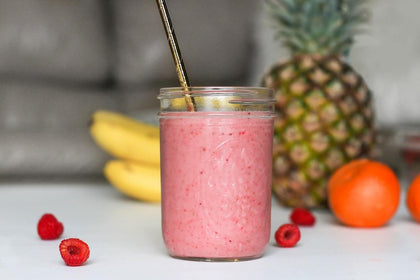Vitamin and beauty trends come and go, and right now, collagen supplements are having a major moment. But what do the supplements actually do? Does collagen really help you grow hair and improve skin? Plus, are they really worth the hype (and money)?
To dig a little deeper into the collagen conundrum, VEGAMOUR spoke to Dr. Lina Kennedy, an acclaimed board-certified dermatologist based in Corona Del Mar, California. Plus, we break down which products you should actually be using to support healthy hair.
#include-related-slider#
What Is Collagen and Why Is It Important?
First things first, what is collagen, and why are we being told to boost it? "Collagen is one of the most abundant proteins on our body," Kennedy explained. "It's essential for bone health, joint health, skin health and for our muscles. Collagen provides structure, and without it, our bodies wouldn't look the same."
Different types of collagen exist in the human body, but here are four of the most common:
- Type I provides structure to skin, bones, tendons, fibrous cartilage, connective tissue and teeth.
- Type II collagen eases joint pain.
- Type III is found in muscles, intestines, blood vessels and the uterus.
- Type IV is also a skin collagen that's an essential structural component.
When it comes to outer beauty, Type I collagen is the star. When your body is naturally plump with it, you will experience fewer fine lines, better skin elasticity, strong nails and (usually) a healthy head of hair. But when the collagen in our body starts to diminish (as it does with age), the skin elasticity can slacken and appear less firm.
"Unfortunately, collagen production slows down in our early twenties," said Kennedy. "By the time we hit 40, we can lose up to 1% of collagen per year — so if there's a way to replace it, people are going to want it!"
Shop: The Hair Collection
Do Collagen Supplements Work, and What Do They Contain?
If skin, hair, and overall body health start to suffer as levels of collagen diminish, it's no wonder why everyone is suddenly rushing toward a collagen product or two. It's a miracle cure ... right? Well, not quite. In fact, for the most part, the jury is still out on the potential benefits of collagen protein on the body.
Learn: How Does Folic Acid Affect Hair?
Is Collagen Vegan?
No, collagen supplements are generally not vegan though some specialized vegan collagen supplements may exist.
Are Collagen Supplement Claims True?
The most popular type of collagen supplements contain hydrolyzed collagen (sometimes marketed as collagen hydrolysate) — a collagen that's broken down into smaller components to be more easily absorbed into the bloodstream. Manufacturers often claim that collagen products are an effective anti-aging protein that will improve the skin's physiology and appearance.
But before you gulp down collagen powder with a dream of eternal youth, you should know that there's currently very little evidence to back up the mighty claims. Kennedy told us, "Supplements aren't considered drugs, so they aren't put through the same strict safety and effectiveness requirements. The Food and Drug Administration does not currently regulate collagen supplementation, so high-quality studies are difficult to obtain, and in turn, the products have a high degree of variation."
In fact, there have been no randomized control trials done to date. Kennedy continued, "Another issue with the data is many of these studies are funded by the same companies that produce the collagen products, so there can be a conflict of interest. A lot of the reported benefits rely on subjective measurements, like visual improvement and patient satisfaction. We need better quality studies to take place."
Read: 7 Reasons to Take Hair Growth Supplements
Questionable Ingredients in Collagen Supplements
And there's controversy. In one consumer report, out of the 28 top-selling collagen protein powders and supplements that were tested, 64% tested positive for levels of arsenic. Not only that, 37% tested positive for measurable levels of lead, 34% contained trace levels of mercury, and 17% tested positive for quantifiable levels of cadmium, which over time can negatively affect stomach acids, bone mineral density and your overall health. Eek.
Animals parts like hooves, ligaments, cowhide, bones and organs all contain collagen and often find their way into different types of collagen supplements. Unfortunately, these animal parts can attract unpleasant and unhelpful arsenic, mercury and metal levels. In 2016, the FDA prohibited using some cow parts in supplements to help minimize the presence of BSE. BSE-infected meat has been linked to neurological disorders in humans — definitely not something you want to find in a collagen supplement. The FDA did exemplify gelatin, which is a key collagen source from the ban, "as long as it's manufactured using specified practices."
What Are the Side Effects of Taking Collagen Supplements?
Marti told us, "Overall, collagen supplements are reported to be generally safe. Although they are generally safe, it's important to keep in mind that you should avoid the supplement if you have an allergy to the source. Always read the label. Some reported side effects have included abdominal bloating and heartburn, and we must take into consideration that there is no standard followed for production of these supplements."
The key takeaway is that there are no known adverse health benefits from taking collagen peptides and supplements. But, of course, there is still research to be done.
Are There Benefits to Collagen Supplements?
Before you ditch your collagen supplements and run in the opposite direction, know that it's not all bad. Some studies show that collagen peptides (hydrolyzed collagen) can improve the skin's elasticity and decrease the signs of aging when taken consistently for several months. Other studies show that collagen supplements can help ease joint pain across the body.
Related: Benefits of Biotin Explained
A Vegan Alternative to Collagen
If you live a plant-based lifestyle, then traditional collagen supplements is definitely off limits. But you don't need to rely on collagen protein for healthy hair growth or plumper skin. Other options are out there for you to explore. GRO Biotin Gummies for Hair features vitamin C, A and E, which help neutralize follicle-damaging free radicals. Formulated without gelatin, the minerals in the supplements nourish the scalp to help support healthy, radiant, shiny tresses.
Also: How to Exfoliate Your Scalp for Healthier Hair
#include-related-slider#
Focus on Nutrition First
For now, the science behind taking collagen supplements is largely inconclusive. While there may be some benefits, there are other ways to boost the health and wellness of your skin and hair. If you think you may be lacking certain nutrients to keep your hair and skin healthy, take a look at your diet and consider adding some foods that help with hair growth into your daily regimen.
More From VEGAMOUR
- Does the Keto Diet Cause Hair Loss?
- 5 Nutrients Your Hair Craves
- How to Challenge Yourself to a Month of Vegan Dieting
- How Often Should You Wash Your Hair? Stylists Explain




















